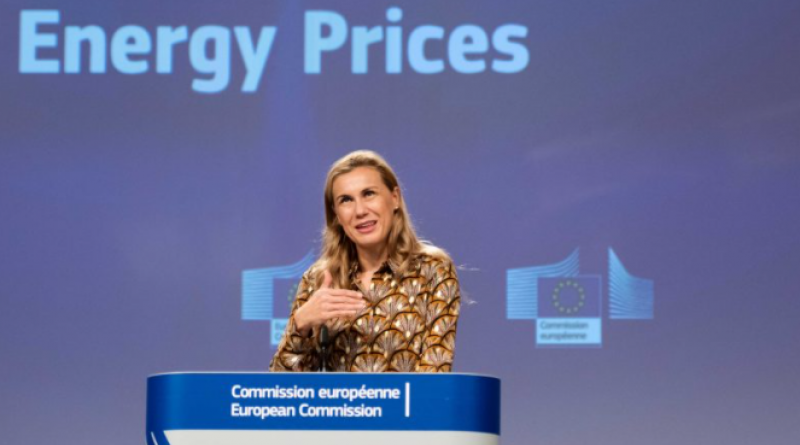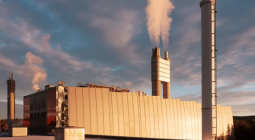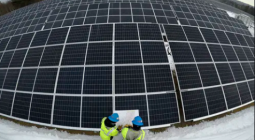EU outlines short and long-term answer to global energy price surge

The European Commission unveiled on Wednesday (13 October) a “toolbox” of measures EU countries will be able to draw from when responding to rising energy prices in the short term, while pointing to an upcoming gas market reform for measures to be considered in the long term.
The measures outlined on Wednesday are designed to alleviate the pressure on households and small businesses “without harming the EU internal energy market or the green transition in the medium-term,” the EU executive said in a statement.
“Short-term national measures include emergency income support to households, state aid for companies, and targeted tax reductions,” the Commission said. Those include energy vouchers that have already been rolled out in France or deferred payments of consumers bills.
“Priority should be given to targeted measures that can rapidly mitigate the impact of price rises for vulnerable consumers and small businesses,” the Commission stressed.
Faced with rising energy costs, the governments in Spain, France, Italy, and Greece have introduced measures such as temporary tax reductions to help low-income households pay their energy bills.
Those are fine under EU single market rules, provided they are “targeted” to the poor and limited in time, the EU executive said. And to finance those, EU countries now have access to unprecedented revenues from the bloc’s carbon market, the Emissions Trading Scheme (ETS).
“Member states received an additional €10.8 billion in the first nine months of 2021 compared to the same period in 2020,” said Kadri Simson, the EU’s energy commissioner.
“There is no limit to how much of this can be used to protect vulnerable households,” she told journalists at a press briefing.
EU member states can also apply a reduced tax rate on energy used by households, or even exempt vulnerable consumers entirely, Simson added, saying “reduced VAT rates are also an option as long as EU minimum rates are respected”.
To complement measures at the national level, the Commission also announced a “zero tolerance policy” on any market manipulation and speculation.
“We are investigating indications for any possible anti-competitive behaviour in the energy market,” Simson said, adding that the European Securities and Markets Authority (ESMA) has been asked to “further enhance monitoring of developments in the carbon market”.
Reactions: consumer groups happy, industry not
European consumer groups welcomed the EU’s “toolbox”, saying urgent measures are needed, especially for the 10% of people in the EU who are already in energy poverty.
“Now it’s up to EU countries to implement them as quickly as possible,” said BEUC, the EU consumer organisation.
Industry groups, for their part, were less convinced. Sectors like aluminum, zinc, and silicon, are among the most heavily impacted by rising energy prices because they are heavy users of electricity. They welcomed the Commission’s initiative but said more must still be done.
“Europe’s power crisis has already led to closures and curtailments in the non-ferrous metals sector, and could lead to job losses and longer-term relocation outside Europe if not properly addressed,” warned Guy Thiran, director general of Eurometaux, a trade association.
“The EU and member states must do more to safeguard their industries from today’s skyrocketing prices, on top of consumer-focused actions,” he said in a statement.
The fertiliser industry has also been heavily impacted by rising gas prices, which account for up to 80% of its costs, leading to temporary curtailments and plant closures across Europe.
“If this situation is not addressed urgently, there is a real risk that temporary closures will lead to permanent closures or relocation of our sector outside Europe,” said Jacob Hansen, Director General of Fertilizers Europe, a trade association.
According to Hansen, the Commission’s proposed toolbox, while a step in a right direction, “falls short” of the industry’s expectations. Down the line, this could translate into higher food prices, he warned.
December gas package
Gas prices surged to record highs in recent weeks as the bloc’s main gas supplier, Russia, kept a tight lid on deliveries, signalling further price pressures on European consumers heading into the winter heating season.
Gazprom has offered little or no extra capacity to ease pressure on the EU gas market, the EU executive remarked on Wednesday, even though it has fulfilled its long-term contracts with its European clients.
To address short term market volatility, the EU executive said it will “adopt by November a regulation setting up new cross-border regional gas risk groups to analyse risks and advise member states” on the appropriate measures to take.
As part of a December package of EU gas market rules, the Commission will “consider revising the security of supply regulation to ensure a better use and functioning of gas storage in Europe”.
It will also explore the potential benefits of voluntary joint procurement of gas stocks by EU member states that wish to do so.
“Today, gas storage is not available everywhere in the EU, and a more integrated European approach could potentially optimise costs and protect against price volatility,” Simson said. “We will look into issues like making access to storage easier and ensure that storage capacities are optimally used.”
In addition, “we will explore the potential benefits and design of voluntary joint procurement of reserve gas stocks” – provided those are “in line with energy market regulation and the EU competition rules.”
Further reforms are expected to be included in the December gas package, which has been in the making for years.
“An important part of the Commission’s December gas package will be enhanced consumer provisions, also for gas markets,” the EU executive said. As part of this, Brussels is considering minimum requirements for contractual conditions, faster and free-of-charge switching, and an enhanced rollout of smart meters to enable consumers to better manage their energy consumption.
And EU governments will be encouraged to appoint a supplier of last resort in the event of market exit or failure of a supplier.
However, calls by Spain and France to decouple gas prices from the electricity market were largely left unheeded.
“There is general consensus that the current marginal pricing model is the most efficient one,” the Commission said, conceding only that “further analysis is warranted” on the matter.
Accelerating green reforms in the long term
Turning to the long term, the Commission insisted that the European Green Deal is the solution, not the problem.
“The only long-term remedy against demand shocks and price volatility is a transition to a green and more efficient energy system based on mostly local sources,” Simson said, adding that wind and solar power “have continued to provide the most affordable electricity on the market throughout the crisis”.
Simson will present the EU’s proposed toolbox to the European Parliament on Thursday (14 October). EU leaders will then discuss the toolbox during a summit meeting on 21-22 October.
13 October 2021
Euractiv




